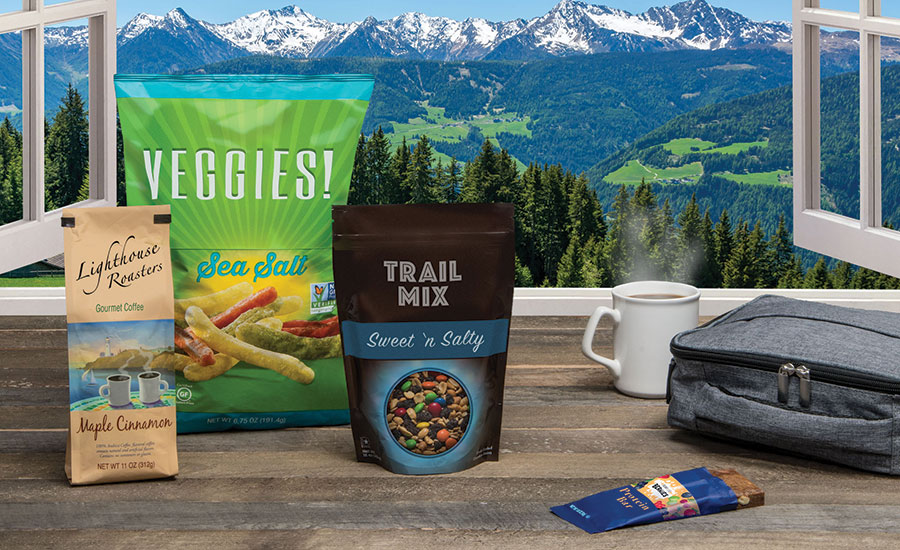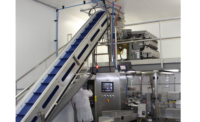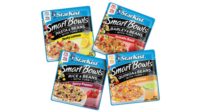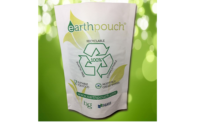Flexible packaging — especially the pouch — is still the fastest growing segment globally. Over the last decade, its share of total packaging in the U.S. increased from 16 percent to its current 19 percent. No matter the global discussion of plastic pollution in waterways or landfill waste, both brands and consumers alike love them. The easy-to-use, on-the-go smaller size packs have been popular for snacks, beverages, dishwasher and laundry detergent pods as well as bite-size candy such as M&M’s, Reese’s and Kit Kat.
The Flexible Packaging Association’s (FPA) report, “A Holistic View of the Role of Flexible Packaging in a Sustainable World,” highlights the sustainability benefits of flexible packaging. FPA commissioned PTIS LLC to provide a holistic view on the sustainability benefits that flexible packaging offers; provide foresight into future sustainability implications for flexible packaging; and develop six life-cycle assessment (LCA) case studies comparing flexible packaging to other packaging formats across a range of products.
One of the LCA case studies was on vehicle oils. Motor oil has traditionally been packaged in rigid HDPE bottles, but recently, it is being packaged in a stand-up pouch with fitments. For this LCA study, flexible stand-up pouches with fitments and rigid HDPE bottle formats were evaluated for their environmental impacts with a cradle-to-grave boundary.
Both package formats contain plastic, but the flexible stand-up pouch has a reduced carbon impact because it uses much less material than the rigid HDPE bottle. When the rigid HDPE bottle and stand-up pouch with fitment are used for motor oil packaging, the flexible structure has a favorable outcome in terms of fossil fuel usage, greenhouse gas emissions, water consumption and materials landfilled. This is largely driven by the pouch using about one-third of the material used in the rigid bottle, which results in less energy used in manufacturing and transporting of the package materials, and a reduction in associated environmental impacts.
Genesis is a new in-store recyclable laminate solution produced by Amcor (amcor.com). The all-polyethylene (PE) laminate looks and feels like traditional oriented polypropylene (oPP)/PE and oriented polyester (oPET)/PE laminates.
Genesis overcomes challenges with production, ease-of-use, durability and aesthetics that have been associated with other packages intended for in-store recycling.
Targeting a wide range of segments — including fresh produce, frozen food, dried fruits, nuts, confectionery, chilled goods and pet food — the new laminate is adaptable to a variety of packaging types and is appropriate for certain medical, home and personal care markets.
Applying an innovative PE formulation, Genesis achieves new levels of clarity, gloss and stiffness close to those of oPP/PE and oPET/PE laminations while delivering an in-store recyclable alternative for brand owners and retailers.
The Genesis product is pre-approved by How2Recycle for in-store recycling with other PE film products across North America.
Another just-out pouch, The SqueezySureSip, was launched by The Barton Group Inc. for in-patient beverage service, a new development in its group of SqueezyStraw (squeezystraw.com) dispensing pouch products. The dispensing pouch provides nearly spill-proof packaging for patient beverages such as juices, milk, nutritional supplements, puddings, cottage cheese, yogurt and other flowable products.
The SqueezySureSip is an excellent packaging alternative for many health care applications such as prefilled dispensing pouches for saline solution, sterile water (hot-fill) and other supply and therapeutic products that can help advance better care at lower costs, a rep from Barton says.
The new pouch is made from low-cost, lightweight flexible packaging materials and can be produced in many sizes. It also can be designed to be freeze / thaw, or in many cases, microwavable for products like macaroni and cheese or chili con carne.
SqueezySureSip is tamper evident, made of lightweight, low-cost flexible materials and doesn’t need a straw, spoon or cup. It also comes in a wide variety of sizes and shapes.
Dow (dowpackaging.com) also created a stand-up pouch, this one made with RETAIN polymer modifiers. It is the first of its kind with oxygen barrier film that can be recycled in a polyethylene recycling stream. The RETAIN polymer modifiers, a portfolio of compatibilizers that allow converters to recycle barrier film trim back into film production without sacrificing optical or physical properties, is a packaging solution that fits the packaging needs for bakery and snack products.
Compared with other control films, RETAIN polymer modifiers help make packages clearer, maintain mechanical properties and significantly reduce gels in films produced from barrier film recycle streams. Packaging made with this technology can be recycled in a polyethylene recycling stream, addressing current recycling challenges and complications in multilayer flexible barrier packaging due to differences in material properties.
Pickles are usually seen in glass jars. One pickle brand chose flexible packaging for its fare. McClure’s Lil’ Pickles come in single-size resealable pouches, perfect for a quick snack. The bite-size gherkin pickles come in Sweet & Spicy, Dill and Spicy. The package design offers an easy way to recognize the three different flavors, with color elements for each flavor.
McClure’s wanted to offer consumers a simple way to enjoy bite-size pickles, building on the success of signature SKUs, Garlic Dill, Spicy Dill, Sweet and Spicy and Bread and Butter Pickles. “To capture market share in the on-the-go, quick service retail categories, we introduced these snack packs that not only provide a healthier snacking option for adults, but also for families and children, picnics and large scale events,” says Bob McClure, co-owner of McClure’s Pickles.
The Detroit, Mich. pickle brand was founded in 2006 by brothers Bob and Joe McClure. The company sells all-natural pickles, mixers and premium salty snacks to more than 4,000 retailers across the U.S., Canada, U.K., Australia and New Zealand.
|
Flexible Packaging and Plastics Pollution By Chris Nothnagle | Senior director of corporate marketing, Toray Plastics (America)The flexible packaging industry faces tremendous challenges related to plastics pollution. Inherent in the problem is an even greater opportunity. Here is Toray’s perspective on the situation and the steps we’re taking to find solutions. We are transparent in order to be as helpful as possible to the industry, government, non-profits and the public. Consumer desire for convenience, lower prices, higher quality and more choice have enabled plastic packaging to be very successful, but the behavior has also led to environmental issues. Most single-use plastics are not sustainable and often become litter. Litter is an unacceptable end-of-life outcome for any product, whatever the material, and we need to work together to stop it.

To eliminate plastic, a simplistic approach to a complex global issue, while appealing to some, is not a sustainable solution. It would exacerbate the problems of greenhouse gases, total carbon footprint and climate change. Toray recognizes these issues but believes that plastics are a great part of the solution. Plastics offer too many benefits to be ignored, and the Flexible Packaging Association has done a good job of enumerating them. We, along with other suppliers and end users, are immersed in the R&D of materials that are fossil fuel-free, compostable, biodegradable and recyclable. For now, the goal is to answer the customers’ call to help them reduce their packaging material content. Our sustainability initiative, launched in 2004, includes operating two solar farms and cogeneration plants, energy and water conservation, recycling and zero-landfill. It is helpful to get involved with state government and share your knowledge to further assist in the mission. We have contributed our knowledge to the Rhode Island Department of Environmental Management’s Taskforce to Tackle Plastics. That commitment has helped break down barriers and build important relationships with elected officials, businesses, non-profits, environmental activists and others in the area. As a member of the Sustainable Packaging Coalition, we aim to help organize for universal recycling standards and industry alignment that will enable investments in next-generation hardware for film production, recycling and the use of post-consumer scrap. We all can do our part. |







